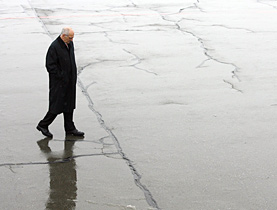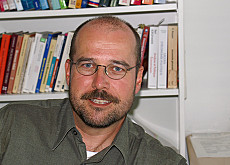How parties fuss over a cabinet seat

As the nomination of candidates to succeed Interior Minister Pascal Couchepin in the cabinet gets underway, experts are questioning the agenda of the parties.
Full-blown campaigning is likely to begin after the summer break, but public discussions have put the spotlight on linguistic and party political issues in the past few weeks. Parliament is due to decide in less than 60 days, on September 16.
Controversy started the day the interior minister announced his resignation and focused on the question of whether Couchepin’s successor necessarily has to be of French, or possibly Italian mother tongue – the two main minority languages in the country.
Some – including from parties other than Couchepin’s Radicals – argue a bilingual German-French candidate from a western region would be just as suitable.
“It is very difficult for observers to know whether these statements show a real concern for the unity of the country. Or whether they merely serve as a pretext,” says Nenad Stojanovic, a political scientist at the Centre for Democracy in Aarau.
Stojanovic points out that the issue of linguistic identity might be used to stress the right to a seat in the cabinet, to commit a candidate to the official party line or simply for self-serving reasons.
He warns that it could prove to be tricky to find and implement linguistic criteria for the cabinet since these would inevitably lead to ethnic definitions.
“It goes against the idea of the Swiss system to formalise linguistic identities or define them by attributing them to ethnic groups,” he concluded an article in the Neue Zürcher Zeitung newspaper.
Public interest
There are a few basic rules in the constitution about the make-up of the seven-member government, including a clause which states that the different regions and official languages of the country have to be represented appropriately.
“There is no clear explanation of what this means. But according to practice it means that at least two cabinet ministers must not be of German mother tongue,” said parliamentary spokesman Mark Stucki.
The rules of the game were eased ten years ago when a restriction based on the geographical origins of a candidate was lifted.
Besides Couchepin there is currently only one other cabinet member who is not of German mother tongue – Foreign Minister Micheline Calmy-Rey. Both have vigorously warned against offending the sensibilities of the minority cultures in the country.
Under the Swiss political system cabinet ministers are chosen by parliament. They share collective responsibility and enjoy relative independence.
They do not answer to their parties and there are no impeachment proceedings. However, parliament can refuse to confirm their appointment.
Given the small size of the cabinet and an average time in office of two four-year terms, elections to the cabinet prompt great public interest.
Repeated attempts by the right and the centre-left for a major overhaul of the rules, including popular elections of cabinet members, have failed in the past.
Rivalries
Party politics are, as in previous cabinet elections, another major field of contention. This time round, the two main centre-right parties appear to be gearing up for battle.
The Christian Democrats, who lost their second cabinet seat six years ago, are hoping to snatch it back, leaving the Radical Party of incumbent Interior Minister Couchepin with just one seat.
“It is a paradoxical situation,” said Georg Lutz, a political scientist at Lausanne University. “These two parties very often vote along similar lines, but they cannot agree to coordinate their policies.”
He says the way forward for both groups, which have suffered setbacks in elections over the past decade, is to find a common platform against the rightwing and the centre-left instead of fighting each other.
But the Radicals and Christian Democrats are divided over cultural and religious differences dating back to the 19th century, according to Lutz.
A taboo was broken when the rightwing Swiss People’s Party broke a long-standing tradition in the formation of the cabinet, known as the Magic Formula, and won a second seat in 2003.
“A new phase in Swiss politics has begun with parties openly vying for political influence. The main political players have still not been able to find a consensus. Now the main criterion for the cabinet election is to win as many votes in parliamentary elections to justify seats in the government,” Lutz said.
“To win back their influence from the centre-left and the rightwing, they will have to find a common platform instead of fighting each other,” he added.
It remains to be seen whether other gender issues, age and political experience or even other criteria will play a part once the campaign enters its decisive stage in September.
Urs Geiser and Armando Mombelli, swissinfo.ch

More
Magic Formula
Switzerland has a multi-party government, based largely on the strength of the political powers in parliament.
The main political parties are represented in the cabinet, but they are not bound by a coalition agreement.
The largest group, the rightwing Swiss People’s Party, won just under 29% in the last parliamentary elections in 2003, ahead of the centre-left Social Democrats with more than 19%.
The centre-right Radicals took about 18% while the Christian Democrats had about 15% of the vote.
The biggest opposition party are the Greens with just under 10%.
The cabinet presently consists of four members of centre-right parties, two centre-left representatives and one from the leading rightwing party.
Members are elected for a four-year term, which ends in December 2011.
The party political make-up, known as the Magic Formula, remained unchanged for nearly 50 years until the rightwing Swiss People’s Party won a second seat at the expense of the centre-right Christian Democrats in 2003.
Parliament’s refusal to confirm controversial Justice Minister Christoph Blocher in 2007 led to the emergence of the small, more moderate Conservative Democratic Party, which is also represented in the cabinet.

In compliance with the JTI standards
More: SWI swissinfo.ch certified by the Journalism Trust Initiative















You can find an overview of ongoing debates with our journalists here . Please join us!
If you want to start a conversation about a topic raised in this article or want to report factual errors, email us at english@swissinfo.ch.